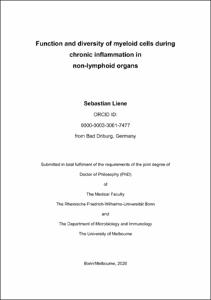Liene, Sebastian: Function and diversity of myeloid cells during chronic inflammation in non-lymphoid organs. - Bonn, 2020. - Dissertation, Rheinische Friedrich-Wilhelms-Universität Bonn, University of Melbourne.
Online-Ausgabe in bonndoc: https://nbn-resolving.org/urn:nbn:de:hbz:5-57888
Online-Ausgabe in bonndoc: https://nbn-resolving.org/urn:nbn:de:hbz:5-57888
@phdthesis{handle:20.500.11811/8334,
urn: https://nbn-resolving.org/urn:nbn:de:hbz:5-57888,
author = {{Sebastian Liene}},
title = {Function and diversity of myeloid cells during chronic inflammation in non-lymphoid organs},
school = {{Rheinische Friedrich-Wilhelms-Universität Bonn} and {University of Melbourne}},
year = 2020,
month = mar,
note = {Different immune cells play a major role in maintaining tissue homeostasis, tissue repair but also in inflammation. Tissue integrity is mainly controlled by tissue regulatory T cells (Tregs), type 2 innate lymphoid cells (ILC2) and myeloid cells. Here, we are using a chronic kidney disease (CKD) model of adenine enriched diet induced crystal-nephropathy and high-fat diet induced obesity to investigate the contribution of Tregs, macrophages and dendritic cells during inflammation. Using a modified gating strategy to distinguish macrophages and conventional dendritic cells (cDCs) we detected that macrophages and cDCs infiltrate the visceral adipose tissue (VAT) during obesity. Here, sex-specific differences show that macrophages and cDCs accumulate significantly more in male VAT. RNA sequencing confirmed a higher pro-inflammatory gene signature in male VAT macrophages and cDCs. Those data indicate that myeloid cells might be a significant contributor to the sex-specific differences in the adipose tissue.
Interleukin (IL)-33 maintaining tissue homeostasis by promoting Tregs and ILC2s in the VAT. Investigating IL-33 and its receptor ST2 during kidney inflammation in the adenine enriched diet induced crystal-nephropathy we show that ST2 deficiency is negligible in a severe CKD onset, whereas using a mild disease onset we detect a disease exacerbation. Additionally, we show that the deficiency for IL-33 leads to a more severe disease progression accompanied by a high influx of several immune cells and lower frequency of effector Tregs.
Transcription factors such as IRF1, IRF4 and BATF are linked to regulate suppressive cell functions e.g. in Tregs and macrophages. Using transcription factor knockout mice, we determined that IRF1 deficiency leads to disease amelioration by reducing macrophage and monocyte infiltration. IRF4 and BATF deficiency lead to reduced numbers of Tregs in the kidney. IRF4-/- but not BATF-/-
showed significant increased myeloid cell infiltration. Bone marrow chimera reconstituted with IRF4 deficient CD4 T cells show reduced numbers of Tregs in the inflamed kidney and correlated with the myeloid cell infiltration. Collectively, the findings point to a sex-specific contribution of macrophages and cDCs in tissue inflammation and indicate that the IL-33/ST2 axis regulates immunosuppressive cells tissue and disease progression specific.},
url = {https://hdl.handle.net/20.500.11811/8334}
}
urn: https://nbn-resolving.org/urn:nbn:de:hbz:5-57888,
author = {{Sebastian Liene}},
title = {Function and diversity of myeloid cells during chronic inflammation in non-lymphoid organs},
school = {{Rheinische Friedrich-Wilhelms-Universität Bonn} and {University of Melbourne}},
year = 2020,
month = mar,
note = {Different immune cells play a major role in maintaining tissue homeostasis, tissue repair but also in inflammation. Tissue integrity is mainly controlled by tissue regulatory T cells (Tregs), type 2 innate lymphoid cells (ILC2) and myeloid cells. Here, we are using a chronic kidney disease (CKD) model of adenine enriched diet induced crystal-nephropathy and high-fat diet induced obesity to investigate the contribution of Tregs, macrophages and dendritic cells during inflammation. Using a modified gating strategy to distinguish macrophages and conventional dendritic cells (cDCs) we detected that macrophages and cDCs infiltrate the visceral adipose tissue (VAT) during obesity. Here, sex-specific differences show that macrophages and cDCs accumulate significantly more in male VAT. RNA sequencing confirmed a higher pro-inflammatory gene signature in male VAT macrophages and cDCs. Those data indicate that myeloid cells might be a significant contributor to the sex-specific differences in the adipose tissue.
Interleukin (IL)-33 maintaining tissue homeostasis by promoting Tregs and ILC2s in the VAT. Investigating IL-33 and its receptor ST2 during kidney inflammation in the adenine enriched diet induced crystal-nephropathy we show that ST2 deficiency is negligible in a severe CKD onset, whereas using a mild disease onset we detect a disease exacerbation. Additionally, we show that the deficiency for IL-33 leads to a more severe disease progression accompanied by a high influx of several immune cells and lower frequency of effector Tregs.
Transcription factors such as IRF1, IRF4 and BATF are linked to regulate suppressive cell functions e.g. in Tregs and macrophages. Using transcription factor knockout mice, we determined that IRF1 deficiency leads to disease amelioration by reducing macrophage and monocyte infiltration. IRF4 and BATF deficiency lead to reduced numbers of Tregs in the kidney. IRF4-/- but not BATF-/-
showed significant increased myeloid cell infiltration. Bone marrow chimera reconstituted with IRF4 deficient CD4 T cells show reduced numbers of Tregs in the inflamed kidney and correlated with the myeloid cell infiltration. Collectively, the findings point to a sex-specific contribution of macrophages and cDCs in tissue inflammation and indicate that the IL-33/ST2 axis regulates immunosuppressive cells tissue and disease progression specific.},
url = {https://hdl.handle.net/20.500.11811/8334}
}






